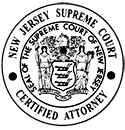A Douglas County jury awarded $12.5 million to a couple for injuries the husband suffered when his Suzuki motorcycle crashed because of what the plaintiffs claimed was the failure of a brake assembly under a recall notice.
According to plaintiffs lawyers and court filings, Suzuki deliberately delayed announcing the 2013 recall of its GSX-R1000 models because the company “did not want this recall to interfere with their spring and summer selling season,” when most motorcycles are sold.
Plaintiff Adrian “A.J.” Johns suffered serious and permanent injuries to his neck, spine and hand that required multiple surgeries, and had to re-learn how to walk, said the attorney.
When Johns was released from the Shepherd Center, “he gets home and there’s this recall notice in his mailbox,” Sherrod said.
Lead attorney Edwards said Suzuki is facing at least five more lawsuits brought by riders injured when the same recalled brake assembly purportedly failed.
The trial lasted more than three weeks and tees up another wrangle over whether and how the award will be apportioned: The panel awarded $10.5 million to Johns and $2 million to his wife for a loss of consortium claim, but allocated 49 percent of the blame to Johns.
On Feb. 23, the plaintiffs filed a brief opposing apportionment and seeking more than $3.4 million in prejudgment interest based on a rejected settlement demand for $10 million under Georgia’s Unliquidated Damages Act. That statute allows interest to be added to the jury award if a settlement is rejected and the verdict is the same or higher than the offer.
The brief asks the court to enter a total judgment for more than $15.9 million.
“Suzuki plans to file post-trial motions to give the trial judge the opportunity to consider and correct errors in the case,” said Goldman via email. “If Suzuki does not succeed in the trial court, the case will be appealed. Suzuki strongly believes both in this case and the quality of its products.”
Sherrod said that—given damning documentary evidence that Suzuki delayed the recall—the defense team lawyers did an impressive job.
“Props to Randy Riggs, national counsel for Suzuki, and Michael Goldman; they tried a great case, especially in light of the documents Suzuki had against them,” he said. “These are some of the worst documents I’ve ever seen.”
The Japanese company that manufactured the brake assembly, Nissin Kogyo, also was a co-defendant but settled confidentially prior to trial, Sherrod said.
According to the lawyers and court filings, Suzuki began investigating problems with loss of pressure several years before the recall and in 2012 redesigned the brake assemblies. The company knew there was a problem by April 2013, with more than 400,000 GSX-R motorcycles sold between 2003 and 2013, and ordered 200,000 redesigned master cylinders.
But because the “vast majority of motorcycle sales occur during spring and summer,” a plaintiff’s filing said, Suzuki “made the conscious decision to delay announcing the recall until Oct. 18, 2013.”
Two months earlier, Johns, now 41, was riding his 2006 Suzuki to work when a tractor-trailer slowed in from of him. When Johns applied his front brake, it failed. He swerved to the side and then attempted to straighten up, but crashed.
Johns suffered a broken back.
“His back was broken in several places; he had spinal stabilization surgery and has hardware in his back,” said Sherrod. “His main injury was a spinal cord injury that did not cause permanent paralysis but caused tingling paralysis in his left arm.”
The problem with the recalled brakes involves corrosion due to a buildup of hydrogen gas, Sherrod explained. A plaintiff’s expert said the result is a “lumpy sludge” in the brake cylinder.
Suzuki’s position is that, while some affected riders may experience “spongy brakes,” they are not a safety issue, Sherrod said. The motorcycle maker has also argued that owners must change their brake fluid every two years, regardless of its condition, and Johns had not done so.
For the full article, click here:



